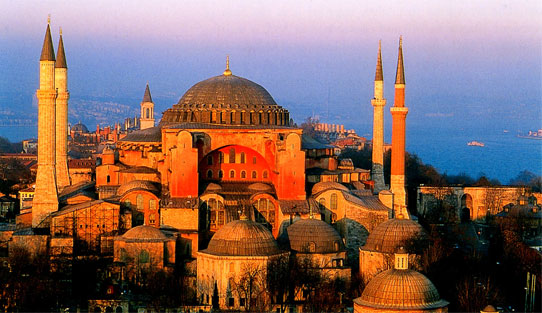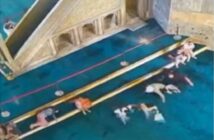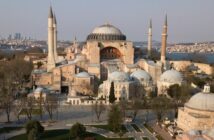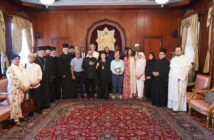 Source: Huffington Post
Source: Huffington Post
Religion News Service | By Jacob Resneck
ISTANBUL (RNS) In this ancient city, there are few sights more iconic than the dome of the Hagia Sophia, towering over the old city for more than 1,400 years.
But recent conversions of former Byzantine-era churches from museums into mosques, encouraged by religious and political leaders, have caused alarm among religious minorities and Turkey’s Christian neighbors.
“We currently stand next to the Hagia Sophia Mosque,” Turkey’s deputy prime minister, Bulent Arinc, remarked last month during a dedication of a museum of Caucasus carpets and rugs in the Hagia Sophia complex. “We are looking at a sad Hagia Sophia but hopefully we will see it smiling again soon.”
Arinc, also a senior Cabinet minister from the ruling Islamic-rooted Justice and Development Party, mentioned two recent conversions of smaller Byzantine-era museums — in Trabzon in the northeast and Iznik near Istanbul — that have become working mosques.
The speech was just the latest call for the building to be converted into a mosque after a sermon in October by the imam of the neighboring Sultan Ahmet mosque. He told worshippers a conversion must take place, echoing a campaign launched by the far-right National Turkish Student Association.
Reaction from the Greek Foreign Ministry to the Arinc speech was swift, calling the speech “an insult to the religious sensibilities of millions of Christians and actions that are anachronistic and incomprehensible from a state that declares it wants to participate as a full member in the European Union.”
“If it is to reopen as a house of worship, then it should open as a Christian church,” the Ecumenical Patriarch Bartholomew — the Archbishop of Constantinople — told Turkish newspaper Milliyet in February, saying that the Hagia Sophia had served as a Christian church for hundreds of years before Constantinople fell to the Ottoman Turks in 1453.
“It was built as a church and not a mosque,” he added.
The Hagia Sophia has been standing since 360, when the first church was constructed soon after the Roman Emperor Constantine converted to Christianity. Two more churches were built on the same site in 415 and in 532.
The Ottoman conquerors refurbished the building into a mosque in 1453. It became a museum after a decree by the founder of Turkey’s secular republic, Kemal Mustafa Ataturk, in 1935.
Some critics say the spate of conversions of Byzantine-era Christian houses of worship from museums to mosques reflects the government’s payback against Turkey’s former secular military elite, which has historically jailed leaders of religious parties and staged coups against elected governments.
“It is mostly a challenge to the secular rulers of Turkish republic,” said Engin Akyurek, a professor of Byzantine art at Istanbul University.
The government “re-converts church-mosques which were used as museums during the republican era so it is related to the domestic politics,” he said.
Still, despite concerns, the conversions continue.
In recent weeks it was announced that the Monastery of Stoudios — the largest Byzantine-era monastery in Istanbul — would be converted into a mosque next year. Part of the former monastery complex became a mosque in the 15th century but fell into disrepair, and after being gutted by two fires, it was abandoned in 1920.
Historians say this will destroy one of Istanbul’s earliest Byzantine monuments.
“To use this building for some function, a mosque or anything else, would mean to reconstruct almost 80 percent of the building,” said Akyurek. “So, it will not be a fifth-century building anymore. It will be a catastrophe for that building.”
With provincial elections slated for March — and expected to be a crucial test of the government’s decade-long rule — some see the museum-to-mosque conversions as a way for the Justice and Development Party to shore up its religiously conservative base, especially in the face of large protests earlier this year challenging its conservative policies, such as a tightening of the sale of alcohol.
Still, others are wary that the party’s political strategy to court religious voters will do irreparable damage to the country’s cultural and religious monuments and antagonize other religions.
“Supporting the reopening of Hagia Sophia has become the litmus test of the true believer,” said Professor Robert Ousterhout, director of the Center for Ancient Studies at the University of Pennsylvania. “Protests by the academic community have fallen on deaf ears.”
[subscribe2]


